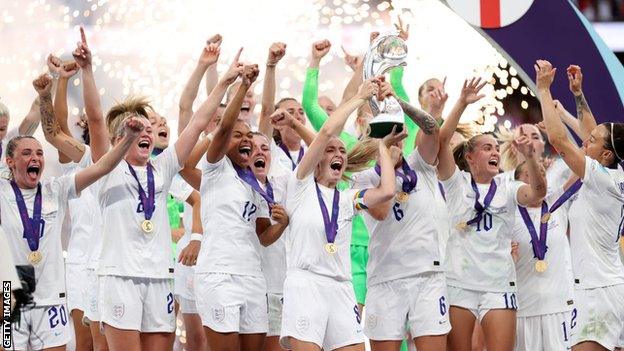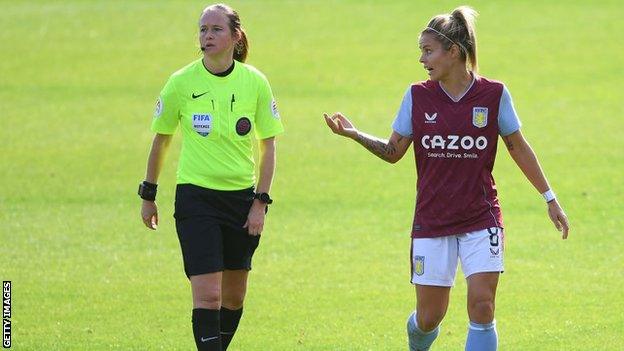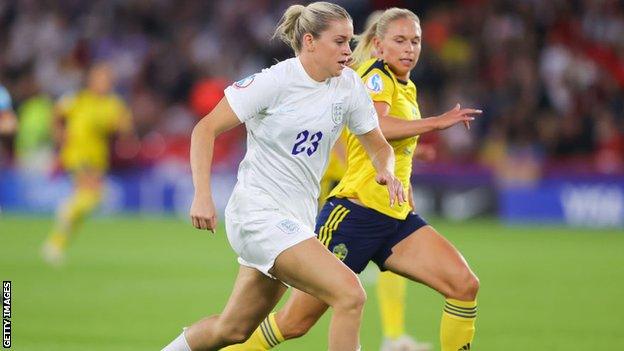FA criticises government over lack of PE in schools for girls
- Published

England won their first women's major trophy in the summer when they beat Germany in the Euro 2022 final at Wembley
The Football Association has criticised the government over a lack of opportunities for girls to play sport in schools, saying it damages grassroots women's football.
Last year a study showed more than half of girls aged 12-16 don't play sports.
Only 41% of secondary schools offer equal access to football for girls within PE lessons in 2022.
"The reality is we haven't got strong policies from the government on PE in schools," said Sue Campbell.
Baroness Campbell, the director of women's football at the FA, added: "It isn't just about sport - it's about health, it's about education, it's about social mobility and social interaction.
"Why aren't we investing in it? Why aren't we putting [PE] at the top of the agenda and making it important?
"We [the FA] are working really hard to try to say we need to put this more firmly at the heart of school life - not just for football, but for kids' health and wellbeing. And yes, we'd like a piece of that for football please."
In October, England captain Leah Williamson and defender Lotte Wubben-Moy met with the UK's former prime minister Liz Truss to discuss equal access to football for girls.
The meeting came after England's Euro 2022 winning side signed an open letter to then-Conservative party leadership candidates Truss and Rishi Sunak.
The letter asked for "every young girl" to be able to play football at school.
"It's the biggest issue we've got. It's the biggest issue for every sport, not just the biggest issue for football," added Campbell.
"It's a policy issue. There's money in the system, but there is just not the policy that says this matters.
"It's far from just about money. It's about policy. It's about belief. It's about the people standing on platforms and saying this matters. It does, massively."
A Department for Education spokesperson told BBC Sport: "We want to continue building on the Lionesses' historic win in at Euro 2022 to inspire a generation of girls to get involved with sport.
"The new Education Secretary is due to meet with the Lionesses soon, to discuss how to make sure all sports provided in schools are equally accessible to boys and girls."
'Female referee growth a work in progress'

Referees are currently part-time in the Women's Super League and Women's Championship
On Tuesday, the FA provided an update on the Women's and Girls' Football Strategy, external, which was launched in 2020.
There are currently 1,495 female registered referees in football but only 3% of officials are progressing through the women's promotion pathway.
Last week, Reading manager Kelly Chambers said the Women's Super League cannot be a "training ground" for officials.
The FA and Professional Game Match Officials Limited (PGMOL) have been in discussions with the WSL over improvements in officiating.
All officials in the top two flights of women's football are currently part-time, and last year the FA said it had no plans to change that in the WSL for at least three years.
"[PGMOL] has the challenge of wanting to staff the game with female referees but there is not enough coming through," said Campbell.
"They are trying to find that balance to make sure the quality is good. It's a work in progress. You can't generate a referee by simply picking them out and putting them on a course."
The FA board have approved a new strategy in men's and women's football this week which will "give more resource and time to refereeing", added Campbell.
Meanwhile, there has been just a 6.6% increase in players living in socio-economically deprived areas accessing elite talent centres for women's football.
The FA's target for 2024 is to see a 19.8% increase but Campbell said there are challenges with resources.
"If we were living in an ideal world we would have 200 [centres]. We can't afford 200 of them. That's the reality. We haven't got the resources to put 200 on the ground.
"That would give you more local access. The minute you have a centre which requires movement to get to it, you start to eliminate some people.
"We have tried to move the centres more to where people are. Our reality is we haven't got enough money for the talent pathway."
'We have to find a balance'

The Women's Nations League will be introduced in Autumn 2023, Uefa announced
Last week it was announced a Women's Nations League will take place for the first time in 2023.
The competition will link into qualification for both the 2025 Women's European Championship and the 2027 Women's World Cup.
Aston Villa manager Carla Ward was among those to raise concerns over the increasing demands of the international calendar on players in the WSL.
"It's tough mentally and physically. At some point there has to be some give. We have to try and find somewhere in the calendar to give them a breather because we have to look after them," said Ward.
Asked if there are concerns over player burnout, Campbell said: "There will be better competitive games. The challenge is how that will fit into the domestic calendar and how we make sure that our player welfare is our number one priority.
"If the competition increases, the intensity increases, the demands on the players increase.
"We're having a look at the domestic calendar. We're just going to have to try and find a balance."